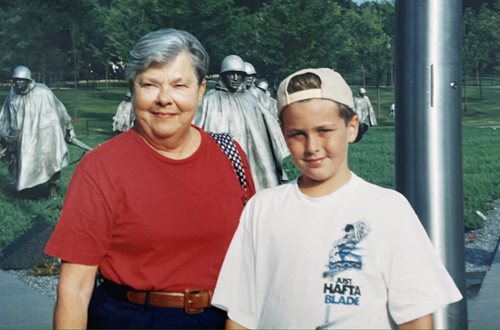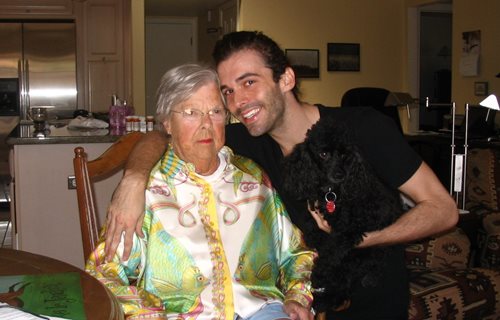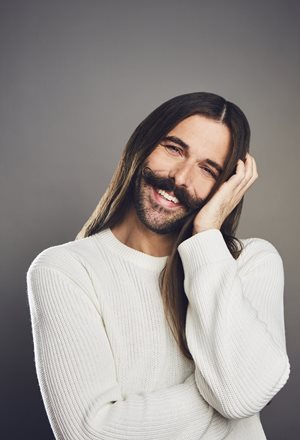
Double Your Impact for the Holidays
Double Your Impact for the Holidays
Your urgently needed year-end gift can go twice as far to provide care and support and accelerate Alzheimer's research this holiday season — and all year long. Show your giving spirit today during this 2x Match Challenge.
Donate NowJonathan Van Ness, known as JVN, is a hairdresser, podcaster, activist, author of “Over the Top: A Raw Journey to Self-Love” and effervescent television personality who rose to fame as part of the TV show “Queer Eye.” We spoke to him about his beloved grandmother Noonie, and how dementia has impacted his family.
Jonathan, you took care of your Noonie, after moving to Scottsdale to be closer to her and your grandfather. You say in your memoir “Over the Top” that it was “the first time I had needed to step up to the place as an adult in my dad’s family.” Tell us about that experience.
I moved to Scottsdale when I was 18 years old. I remember the exact date: October 7, 2006. I really only got to see my paternal grandparents at Christmas every year, so this was an opportunity to get to spend more time with them. At almost 19, I could barely change a tire, but I know my being there was a source of comfort.
Fridays were our thing! I would pick up my grandma Noonie, take her to the salon and blow out or cut her hair. We would always get food after, which would inevitably turn into a visit to the needlepoint shop or the post office. It was running errands, but it was always so much fun! And it was consistent. Every Friday, come rain or shine, from October to April. My grandparents would do that cute little snowbird thing that older folks do, spending winter in Arizona, coming down from their home in Bloomington, Illinois.
Tell us about your Noonie. What was she like?
Noonie was a fighter. She was a teacher, the family breadwinner while my grandfather Lyle was finishing school, and she outlived a terminal cancer diagnosis in the 1990s. Later in her life, she had her own caregiving streak after my grandfather severed half of his hand trying to fix a porcelain toilet tank that cracked in half. Although his hand was reattached, it never really worked the same way again. He was still a practicing doctor at age 73, part-time, and he had to learn to do everything left-handed. Noonie would tie his shoes, close his buttons. So they got very, very close. I am sure they got on each other’s nerves! But I know they loved each other, and were hardly ever apart.
 Noonie also had this young person complex where she always thought she was about 40, so whenever I would bring her into the salon with the other older women, she would make a point to greet each woman, telling me: “You have to say hello to your elders. It’s the kind thing to do.” What could be cuter?
Noonie also had this young person complex where she always thought she was about 40, so whenever I would bring her into the salon with the other older women, she would make a point to greet each woman, telling me: “You have to say hello to your elders. It’s the kind thing to do.” What could be cuter?
What signs or symptoms of dementia did you first notice in your grandma?
The signs came on pretty suddenly, the second year I was there, our second season together. I was taking Noonie home on Friday, and there was a moving truck in front of us. She said, “Did you just see the pterodactyl fly out the back of that car?” I was just like: “Whoa.” I told her that I thought it was just a bird, but she was adamant. Noonie, this woman who would never raise an eyebrow, was literally irritated with me for challenging her. Up until that moment, I’d never seen my grandma act cross.
I called my dad that night, and we agreed that clearly something was going on with Noonie, but we thought that it may be a slow progression. It did not change our routine, and I was always there for her, every Friday.
I’m aware of how lucky I was to have that time with her. Some days she was all the way there, completely present, and other times she would see things that weren’t there, but I would keep her calm, agree with her, and we kept our schedule. It was a blessing.
When did you notice a larger decline?
It wasn't until I was 22, in 2009. She came back down to Arizona from Illinois and it was obvious she was much worse. She was now having issues with mobility and her cognition. I also noticed a definite new level of irritability. But it was most worrying to see the disease attack the part of her brain where she held memories with my grandfather. She would say things like: “My parents are going to be there when I get home, so I need to make sure that Lyle is not there.” She thought she was young, being courted by my grandfather.
 She never forgot that I was her grandkid, not ever. And so when she said something about her ‘boyfriend’ being at home with her, she would look at me, someone she recognized, and immediately know what she was thinking wasn't right. This seemed to scare her, and she would just stop talking. On occasions like that, she would look at me, really look at me. She still knew me.
She never forgot that I was her grandkid, not ever. And so when she said something about her ‘boyfriend’ being at home with her, she would look at me, someone she recognized, and immediately know what she was thinking wasn't right. This seemed to scare her, and she would just stop talking. On occasions like that, she would look at me, really look at me. She still knew me.
When Noonie got an infection, it gave her a fever, which seemed to make her disease gallop. We were able to get her back to Bloomington, Illinois, and she passed away two months later, on March 28, my 22nd birthday.
At first, her passing on my birthday made me really sad. But then I thought that there had to be some sort of cosmic spiritual thing about that, as if she chose to depart this world on the day that I entered it.
You talk a lot about self-care and its importance. Can you speak to the importance of self-care for caregivers?
Caregivers: Know that it is okay to take time for yourself; sometimes I need a few hours to be by myself for my classic version of self-care, but I usually put myself on the back burner, pushing myself off until Sunday. I'm trying to treat myself better. It is easier said than done, but we are all works in progress! Don’t put yourself off until Sunday.
I think our intuition tells us what that self-care looks like. Because we're all so different, we need so many different things. One thing I've been really curious about lately is the idea of self care versus dissociation. You know: “Am I eating a piece of cheesecake and numbing myself? Should I be meditating?” I ask myself questions, like: “What would it be like tapping into what's bothering me today?” But sometimes you have to have the cheesecake.
One thing I know is that completely tapping out of the reality of my pain isn’t for me. Caregivers are looking at a significant amount of pain, and it makes you want to tap out. Throughout the pandemic, I’ve been thinking a lot about the difference between tapping out and toughing it out. Sometimes we go through moments of tapping out, tapping back in. Otherwise, it can all be too daunting.
How have you been nurturing your relationships during the 2020 pandemic? How can families stay connected during these difficult times?
If you want a lovely way to stay connected to those you love, write letters! Get all 1800s with it. I really like taking the time to sit and connect in that more deliberate way. It is so classic, whether you have an actual pen pal or write to someone you know.
Relationships are like a garden: you definitely reap what you sow. I personally nurture most of my friendships by talking about figure skating. A LOT. Find whatever your figure skating is and connect with others who have that same interest.
Expecting relationships to feel the same — to be the same — during a pandemic isn’t the way to go. But we can still find meaningful ways to connect and care for ourselves and others. It’s how we get through times like these: together.
 About: Born and raised in Quincy, Illinois, Jonathan Van Ness is internationally known as the grooming expert on Netflix series “Queer Eye” and for hosting the weekly “Getting Curious with Jonathan Van Ness” podcast, in addition to his work as an author and activist. On December 31, 2020, he shared a recap of his year on Instagram, along with the surprise news that he married his partner, Mark Peacock, saying: "I got married to my best friend & have a loving partner to continue building my life with." Find out what Jonathan is doing next by visiting him on Instagram.
About: Born and raised in Quincy, Illinois, Jonathan Van Ness is internationally known as the grooming expert on Netflix series “Queer Eye” and for hosting the weekly “Getting Curious with Jonathan Van Ness” podcast, in addition to his work as an author and activist. On December 31, 2020, he shared a recap of his year on Instagram, along with the surprise news that he married his partner, Mark Peacock, saying: "I got married to my best friend & have a loving partner to continue building my life with." Find out what Jonathan is doing next by visiting him on Instagram.
Related articles:
Be a Healthy Caregiver
